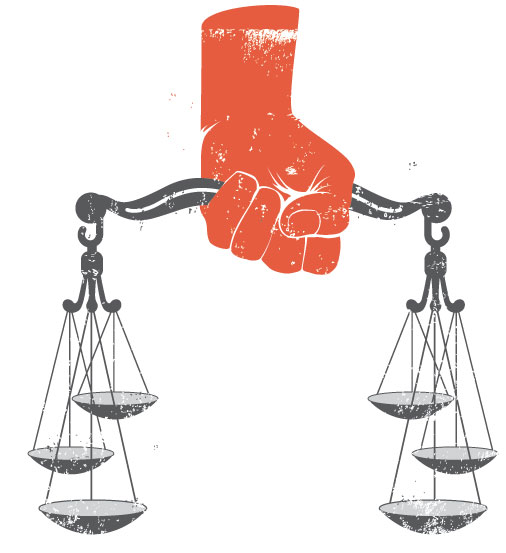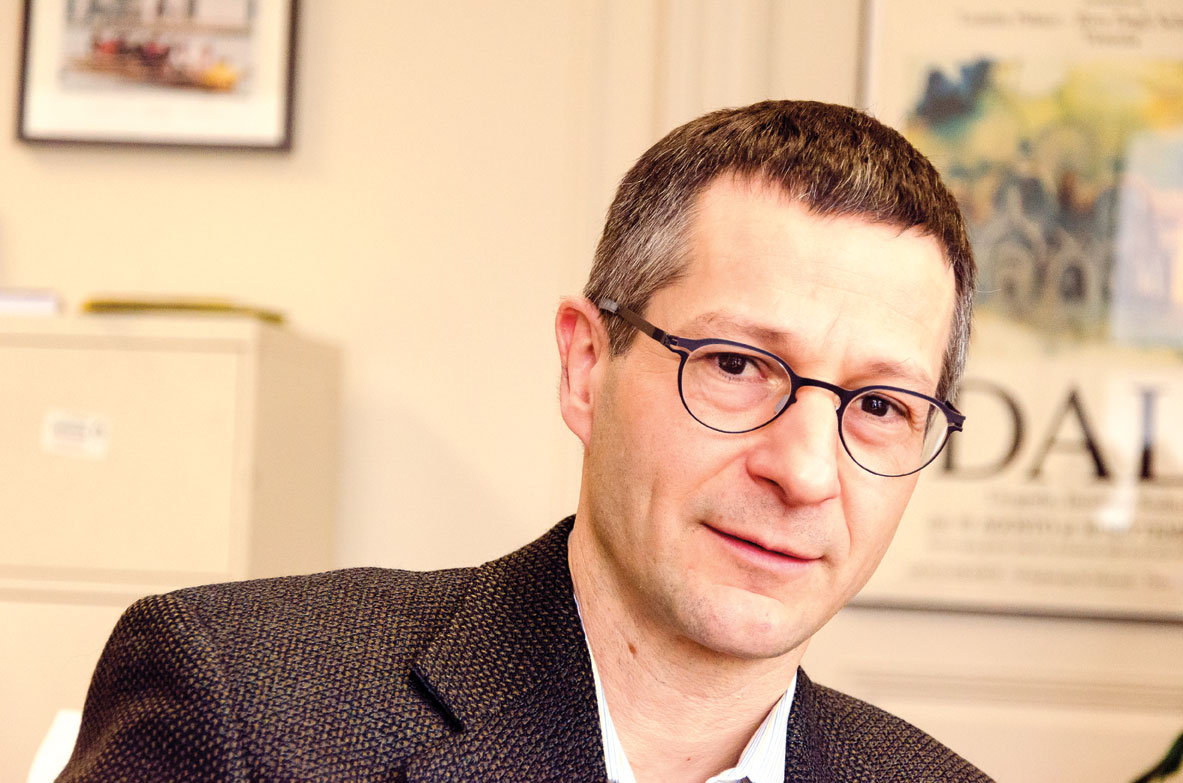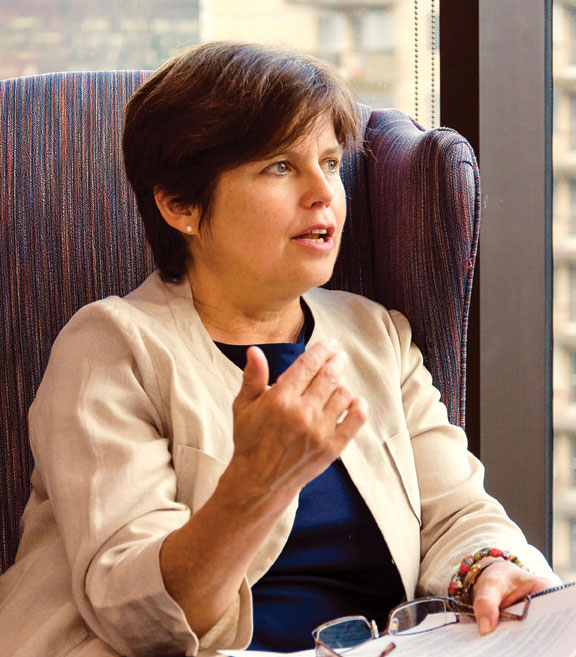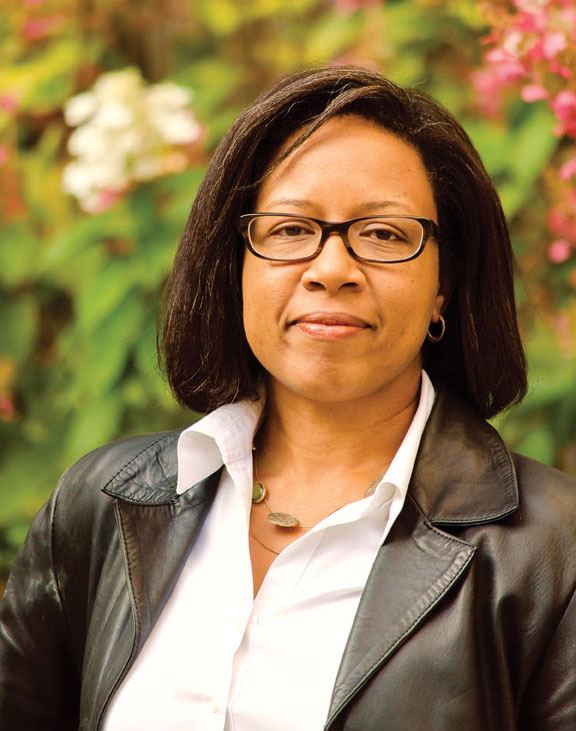
By Victoria Leenders-Cheng
In the decade since it was founded, the Centre for Human Rights and Legal Pluralism at McGill’s Faculty of Law has probed the challenge and meaning of securing human rights in a legally diverse world.
Later this year, the Truth and Reconciliation Commission of Canada will present a report to the federal government about how residential schools damaged Indigenous communities and individuals throughout the 19th and 20th centuries, with recommendations on how to redress the past. The report will mark the culmination of four years of public hearings, statements, survivor testimonials and academic research. Researchers from McGill’s Centre for Human Rights and Legal Pluralism are among those who have contributed. The CHRLP’s participation in such a wide-ranging inquiry exemplifies its belief in engaging directly with real-world issues – and the essential need to view complex issues through multiple lenses.

“Human rights is one of the defining features that gives the Faculty of Law its specific identity,” says the CHRLP’s founding director, René Provost, tracing this lineage to such figures as John Humphrey, who authored the first draft of the Universal Declaration of Human Rights in 1948; poet and professor F.R. Scott; and, more recently, Member of Parliament Irwin Cotler. The Centre has taken that rich tradition of inquiry and connected it to work being done in other disciplines, with the goal of re-conceptualizing human rights. Provost remembers his early years at McGill, and how his academic interactions were largely limited to his own faculty. “Today, I collaborate constantly with people in other disciplines,” he says, referring to research projects and teaching courses with professors in the School of Social Work and the departments of Anthropology and Political Science.
The Centre’s Global Echenberg Conference series on human rights is another example of this boundary-crossing approach to scholarship. As Nandini Ramanujam, executive director of the CHRLP, points out, “the series brought together a cross-section of professors, students, judges, lawyers, politicians, business people, and young leaders from around the world with the aim of bridging academic and pragmatic discussions about human rights. The conferences gave rise to two published books, numerous working papers and a global community of human-rights specialists.

Colleen Sheppard, the current director of the CHRLP, explains that the Centre has endeavoured to integrate scholarship, teaching and community engagement. “They are integrated – our research and engagement with other scholars is central to what we are teaching and to our outreach.”
This integrated approach is also inherent in the Centre’s somewhat complex name: the Centre for Human Rights and Legal Pluralism. Legal pluralism addresses the existence of multiple legal orders, be they formal (international, national, provincial, or municipal law) or informal (religious communities, institutional norms, or indigenous legal norms, to name a few). Human rights, on the other hand, is generally considered a universal concept, with laws that apply globally.
“Juxtaposing human rights with legal pluralism seems, at first blush, contradictory,” Sheppard says. “But the research and scholarship we do re-conceptualizes human rights in these multiple and co-existing legal orders.” As Frédéric Mégret, Centre member and Canada Research Chair in Human Rights and Legal Pluralism, has explained, “a pluralist human-rights agenda seeks to understand how different states or groups within them emphasize different rights (e.g. freedom of expression vs. freedom of religion) and how this creates complex distortions that are as important to human rights as the pursuit of a coherent doctrinal whole.”
Yet the Centre is also relentlessly grounded in action. François Crépeau, a law professor and Centre member, was appointed the United Nations Special Rapporteur on the Human Rights of Migrants in 2011. He is charged with examining and protecting the rights of migrants across the globe, and with reporting his findings both to the UN General Assembly and to the Human Rights Council.

In his scholarly work as in his role as Special Rapporteur, Crépeau emphasizes the need to balance competing rights and interests: states need to be able to ensure their own national security, but they also have international obligations. “Western democracies are increasingly caught between accepted rights-based standards of behaviour toward all individuals, and political pressures to effectively and securely control their borders. There is genuine tension between international human-rights law and the exercise of state sovereignty.”
This tension has grown since the events of 9/11, with many states implementing measures that prevent or slow the entry of migrants, resulting in an increase in irregular migration. “Asylum-seekers and refugees are denied access to international protection or returned to territories where their life or freedom is threatened,” he noted, adding that desperate people then rely on informal networks or people-smugglers in their search for a better life, and the states where they end up view their presence as “illegal,” or outside the circle of legality.
“Migration is in the DNA of humankind,” Crépeau said, speaking to the General Assembly in 2011. “It is how we cope with environmental threats, with political oppression, but also with our desire to create a meaningful future for ourselves and our children.” The key, he emphasized, is finding a way to live together and adopting rights-based policies that empower individuals to fight for their rights.
Another Centre researcher who exemplifies this blend of scholarly work and active engagement is law professor Adelle Blackett, whose focus on domestic workers has resulted in her engagement as an expert for the International Labour Organization (ILO), where she has helped develop a new standard for the rights of domestic workers.
“The ILO first put the issue of domestic work on their agenda in 2008 and they needed the rationale for a new convention, they needed a report on law and practice around the world, and they needed it in a few months!” Blackett recalled. “A number of McGill students helped out as research assistants and they were tremendous.”

The initiative gave Blackett the opportunity to explore the human-rights aspects of domestic work and to flesh out the notion of “decent work.”
“It was a policy document, not an academic article, and that’s always fun for an academic,” she continued, “to produce a document that’s persuasive, that’s succinct, that isn’t heavily theoretical, but that does draw on theory in constructive ways.” She is also conducting a research project examining why domestic workers’ rights are so difficult to protect, and chronicling “simple, supportive and smart” examples of regulatory innovation in that area.
Indeed, Blackett’s work has had an influence on policy, not only on an international scale but also here in Quebec as a member of the provincial Human Rights and Youth Rights Commission that has issued reports on migrant domestic and agricultural workers’ rights.
“These researchers, and much of the work at the Centre, asks what human rights mean and how to ensure that human rights do not exist only on paper only but are actualized in everyday life,” Sheppard says.
It’s the chance to make that kind of real-life impact that drew Sheppard and her colleagues to the Truth and Reconciliation Commission. She submitted a paper about systemic discrimination: how attitudes of racial supremacy may result in ongoing harms both for residential-school survivors (in terms of health problems, problems of addiction, and problems of violence and domestic violence) and in Indigenous communities more broadly. Professor Kirsten Anker explored the meaning of reconciliation itself, including how to acknowledge past wrongs and address them. Professor Mark Antaki examined reconciliation discourse in Canadian constitutional law. Their research brings a nuanced perspective on human rights to the work of the Commission and continues the Centre’s work in bridging theoretical concepts and everyday life.
This undertaking is as important in a local context as in an international one, Sheppard points out. “We sometimes think about human rights only with respect to faraway places or developing countries. As a Centre, we feel that it is important to recognize that there are also some fundamental and critical human-rights issues that need to be addressed in Canada.”
The Centre for Human Rights and Legal Pluralism receives funding from many donors, including Mr. David O’Brien and the Nussia and Andre Aisenstadt Foundation.

Does the centre have any works published or in progress that address any of the legal issues unique to USA Placed Victims-Survivors of Canadian Scoops/60’s Scoops? In addition to those victims of 60’s Scoops who were kept within Canada, thousands were not kept within Canada but instead placed in USA and west Europe, a.k.a., USA Placed Victims-Survivors of Canadian Scoops. This group of victims faces unique set of legal challenges, both in their attempts to achieve recognition as victims of this genocide AND compensation. Only 1, The 1st USA Placed Victim-Survivor of Canadian Scoops to achieve recognition from TRC-Canada and… Read more »